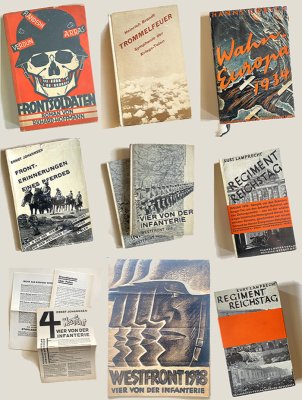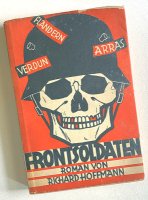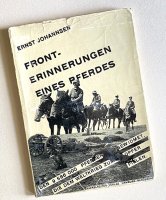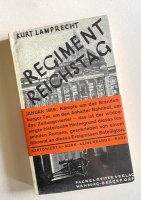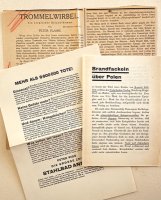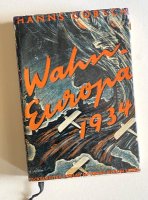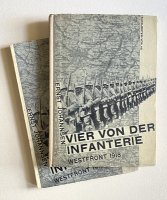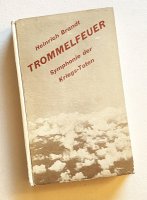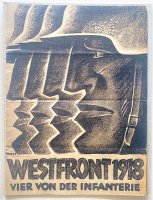studio montespecchio
Banned and burnt by the Nazis in the early thirties: Fackelreiter-Verlag - 6 of the 16 titles,
„Frontsoldaten“, „Trommelfeuer. Symphonie der Kriegs-Toten“, „Fronterinnerungen eines Pferdes“, „Vier von der Infanterie. Ihre letzten Tage an der Westfront“, „Wahneuropa 1934“, „Regiment Reichstag“
SOLD
Item Details
Hamburg-Bergedorf, Fackelreiter Verlag, 1928-1931
“nach 33 verboten”
the history of “book burning”, is a more than sad reality that took place throughout history - as far as we know it goes back already to the Chinese Qin dynasty (221–207 BC).
a campaign conducted by the Deutsche Studentenschaft, to ceremonially burn books in Nazi Germany and Austria in the early 1930s was one of the most infamous burnings ever.
the literature banned by the National Socialists included works of prominent Jewish, liberal, leftist and pacifist writers and so-called realistic war literature, referred to by the National Socialists as „Entstellende Kriegsliteratur“, as well as socially critical books.
The „Liste des schädlichen und unerwünschten Schrifttums“ (“List of harmful and undesirable literature”) contains 16 titles from the Fackelreiter-Verlag, most of them successfully published not only in Germany, but also in numerous translations abroad.
Walter Hösterey (pseudonym Walter Hammer) founded in 1921 the publishing house Junge Menschen and in 1922 the Fackelreiter-Verlag. He was a co-founder of the Republican Party of Germany and was one of the signatories of the urgent appeal for a united front of the workers' parties against National Socialism. In 1933 he was briefly placed in "protective custody".
Hoffmann, Richard – Willy Geisler (buchgestaltung)
Frontsoldaten.
Hamburg – Bergedorf: Fackelreiter-Verlag, 1928.
Small quarto, 246 pages. Stiff cardboard wrappers + Illustrated dust wrappers. Tiny pieces missing on top and bottom of wrappers. Rare with a near complete dust wrapper.
- First edition. "In treuem Gedenken gewidmet den Opfern des Weltkrieges und ihren Müttern, insbesondere den Millionen Toten von Verdun und den Kameraden von der 256. Infanterie-Division".
Brandt, Heinrich.
Trommelfeuer. Symphonie der Kriegs-Toten.
Hamburg-Bergedorf: Fackelreiter-Verlag, 1929.
Octavo, 201 pages. Illustrated paper (photomontage) over boards.
- First edition.
Gobsch, Hanns
Wahn-Europa 1934. Eine vision.
Hamburg – Berlin - Leipzig: Fackelreiter Verlag, 1931.
Small quarto, 348 pages. Printed off-white cloth. Illustrated (reversible) wrappers by Heinrich Jansen. Repaired wrappers, with some dark spots on rear wrapper, but front wrapper complete.
- First edition. Loosely laid in a cut out article by Peter Flamm: Trommelwirbel. Ein Utopischer Briand Roman. (Probably published in "Die Weltbühne" in 1932.
“EINE UTOPIE ?
Ja, wenn man darunter den prophetischen und furchtlosen Ausblick auf eine nahe Zukunft verssteht, die drohend heraufwächst als Frucht blutgetränkter, unerslöster Vergangenheit und tatenlos vergeudeter Gegenwart. In „Wahn Europa 1934" wirft voreweggenommene Historie ihre geisterhaften Schatten voraus. Dichterphantasie gebiert nicht hemmungslose Wahngebilde, sie gestaltet nur kühn und mitleidlos eine verzweifelt echte Wirklichkeit, harte Tatsachen, die auf dem Sprung sind, den Erdteil Europa in ein Chaoszuzerhämmern. Fünf kurze Tage und Nächte rollen in erregender Vision vorüber, fünf Tage und Nächte, die einen Erdteil aus dem Scheinzustand des Friedens und der Gemeinesamkeit in Strudel und Katastrophen schleudern.
Einsturz von Göttern, Götzen und Völkern!
Hanns Gobsch schreibt, indem er mit heißem Herzen und kalter Vernunft die Fäden eines zugleich grandiosen und grauenvollen Geschehens führt, den unheilvollen Knoten schürzt und ihn von einem unerbittlichen Geschick zerschlagen läßt, die Tragödie Europas, die - verhallt sie als Dichtwort ins Leere - sich bald ins Weltbuch einschreiben müßte, dann aber mit Granaten, Trümmern und Leichengeruch.” (text from front flap)
Johannsen, Ernst
Fronterinnerungen eines Pferdes. Den 9586000 Pferden gewidmet die dem Weltkrieg zum Opfer fielen.
Hamburg-Bergedorf: Fackelreiter-Verlag, 1929.
Small quarto, 54 pages, Stiff wrappers. Photographic (collage) dust jacket. Jacket with tiny, repaired tears and wrinkled, but complete.
- First edition. ‘nach 1933 verboten”
Johannsen, Ernst
Vier von der infanterie. Ihre letzen tage an der westfront 1918.
Hamburg: Fackelreiter verlag, 1929
Small quarto, 108 pages. Half cloth with illustrated paper over boards.
+
another copy, this one with stiff wrappers + illustrated dust wrappers.
- Both copies from the second edition (11.-20. Tausend)
added:
Pabst, G.W. - F. Weber (design)
Westfront 1918: Vier von der Infanterie (Illustrierter Film-Kurier)
Berlin: Verlag Alfred Weiner, 1930.
Quarto, an 8-page folded flyer announcing Pabst’s first "talkie": Westfront 1918: Vier von der Infanterie, based on novel by Ernst Johannsen, illustrated throughout and printed in photogravure. Self-wrappers. One tiny tear in front wrapper, a small, chafed area on rear wrapper, spine partly separated, but still a very good copy of this rare and fragile publication.
- First edition. G. W. Pabst, made in 1930 the movie Westfront 1918 from a screenplay by Ladislaus Vajda and based on Johannsen’s ‘Vier von der Infanterie’.
Westfront 1918 was a critical success when it was released. Following the rise of National Socialism only a few years later, the new government banned the movie from public viewing for its extremely harsh criticism, similarly to many war poets of the era it depicts, of the mechanized and systematic slaughter of an entire generation of young men during a mere four years of trench warfare. Nazi Party Propaganda Minister Joseph Goebbels accordingly denounced Westfront 1918 as, "cowardly defeatism".”
Lamprecht, Kurt
Regiment Reichstag. Kampf um Berlin Januar 1919.
Hamburg-Bergedorf: Fackelreiter Verlag, 1931
Small quarto, 270 pages, Stiff wrappers + illustrated (reversible) dust jacket + original publisher’s wraparound band. Fine.
- First edition. Loosely laid in: a 4-page folded announcement of the publication of Kanrad Seiffert’s anti-war novel: Brandfackeln über Polen. Fackelreiter Verlag,1930; a 4-page folded announcement of the publication of Peter Riss’ anti-war novel Stahlbad anno 17 - Die große Zeit. Fackelreiter Verlag,1930 + a 4-page folded announcement of the publication of anti-war novel Vier von der Infanterie by Ernst Johannsen.
studio montespecchio
jan van der donk
600 via lucarini
montespecchio, modena, 41055
Italy
Cell: +39 3395082069
Featured Catalogue
Visit Website

More Information
Booth 36
Shipping and Returns
orders usually ship within 7-10 business days. Shipping costs are based on books weighing 2.2 LB, or 1 KG. If your book order is heavy or oversized, we may contact you to let you know extra shipping is required.
Additional Information
we specialize in historically and visually important rare books, magazines and ephemera related to XXth century avant-garde architecture, art, design and photography.
